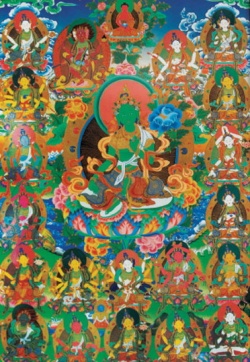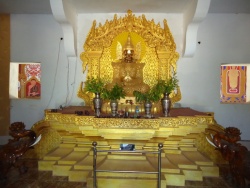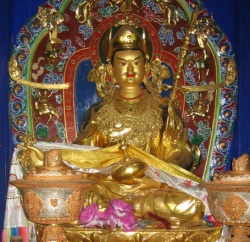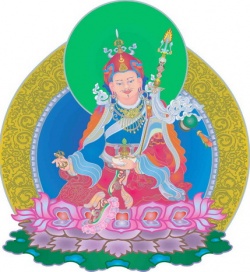Difference between revisions of "The Food"
(Created page with " Accepting and consuming food Food collection. If a bhikkhu is invited for a meal or served a meal in his monastery, he can accept it. If not, he must...") |
|||
| Line 1: | Line 1: | ||
| − | + | <nomobile>{{DisplayImages|2589|813|1718|3104|1009}}</nomobile> | |
| Line 33: | Line 33: | ||
There are periods during which certain types of [[food]] are forbidden, or cannot be stored. See the [[pācittiya]] 37 and 38. | There are periods during which certain types of [[food]] are forbidden, or cannot be stored. See the [[pācittiya]] 37 and 38. | ||
| − | Also, the [[food]] can only be accepted if certain factors are respected. See the [[pācittiya]] 40. | + | Also, the [[food]] can only be accepted if certain factors are respected. |
| − | A [[bhikkhu]] must never show his preferences with [[respect]] to [[food]]. He must not even show whether he likes or not what is served to him. | + | |
| + | See the [[pācittiya]] 40. | ||
| + | |||
| + | A [[bhikkhu]] must never show his preferences with [[respect]] to [[food]]. | ||
| + | |||
| + | He must not even show whether he likes or not what is served to him. | ||
If a dāyaka offers to choose a dish or a menu for him, he must answer that [[bhikkhus]] do not choose, that they eat whatever is given to them. | If a dāyaka offers to choose a dish or a menu for him, he must answer that [[bhikkhus]] do not choose, that they eat whatever is given to them. | ||
| Line 46: | Line 51: | ||
However, he must not accept meat of an [[animal]] who has been slaughtered purposely for [[offering]] to the [[saṃgha]] or to him, or meat from ten [[animals]] considered at the time of the [[Buddha]] (and still today) as [[noble]] or [[sacred]] by a part of the population. | However, he must not accept meat of an [[animal]] who has been slaughtered purposely for [[offering]] to the [[saṃgha]] or to him, or meat from ten [[animals]] considered at the time of the [[Buddha]] (and still today) as [[noble]] or [[sacred]] by a part of the population. | ||
| − | To avoid offending those [[people]], the [[Buddha]] forbid the [[bhikkhus]] to eat these ten kinds of meats which are: | + | To avoid offending those [[people]], the [[Buddha]] forbid the [[bhikkhus]] to eat these ten kinds of meats which are: |
| + | <poem> | ||
| + | [[human]] flesh, | ||
| + | {{Wiki|dog}}, | ||
| + | [[horse]], | ||
| + | [[elephant]], | ||
| + | leopard, | ||
| + | [[tiger]], | ||
| + | [[lion]], | ||
| + | bear, | ||
| + | hyena and | ||
| + | {{Wiki|snake}}. | ||
| + | </poem> | ||
The flexibilities | The flexibilities | ||
| Line 69: | Line 86: | ||
| − | The [[pātimokkha]] includes numerous {{Wiki|rules}} regarding accepting and consuming [[food]]. See especially the [[sekhiya]] 27 to 56. | + | The [[pātimokkha]] includes numerous {{Wiki|rules}} regarding accepting and consuming [[food]]. |
| + | |||
| + | See especially the [[sekhiya]] 27 to 56. | ||
| + | |||
| + | |||
Conduct to observe when eating | Conduct to observe when eating | ||
| Line 77: | Line 98: | ||
The best places must be reserved to the more senior. | The best places must be reserved to the more senior. | ||
| − | All the members of the [[saṃgha]] must eat at the same time. Those who arrive first must [[meditate]] whilst waiting for others. Nobody must eat before the majority have already arrived at the table. | + | All the members of the [[saṃgha]] must eat at the same time. |
| + | |||
| + | Those who arrive first must [[meditate]] whilst waiting for others. Nobody must eat before the majority have already arrived at the table. | ||
Each [[bhikkhu]] must make an [[effort]] to arrive punctually. The conduct at the table must be based on [[equanimity]] and moderation. | Each [[bhikkhu]] must make an [[effort]] to arrive punctually. The conduct at the table must be based on [[equanimity]] and moderation. | ||
| − | The dishes must not be kept close to oneself but passed around the table to allow everybody {{Wiki|equal}} access. Reasonable amounts of [[food]] must be served in the [[bowl]] (or plate) to avoid leaving remainders at the end of the meal. Every [[bhikkhu]] must avoid leaving the dining room with any [[food]]. | + | The dishes must not be kept close to oneself but passed around the table to allow everybody {{Wiki|equal}} access. |
| + | |||
| + | Reasonable amounts of [[food]] must be served in the [[bowl]] (or plate) to avoid leaving remainders at the end of the meal. | ||
| + | |||
| + | Every [[bhikkhu]] must avoid leaving the dining room with any [[food]]. | ||
The taking and chewing of each mouthful of [[food]] must be done with [[attention]]. He must abstain from any [[conversation]] at the table, eat in [[silence]] and not make noise with the ustensils. | The taking and chewing of each mouthful of [[food]] must be done with [[attention]]. He must abstain from any [[conversation]] at the table, eat in [[silence]] and not make noise with the ustensils. | ||
| − | Every [[bhikkhu]] must eat properly, using a spoon to serve himself and wash his hands before eating, especially if he eats with his hands. He must avoid {{Wiki|spitting}}, coughing or sniffling. If this is unavoidable, the [[bhikkhu]] is required to do it discretely by turning the other way or moving away from the table. | + | Every [[bhikkhu]] must eat properly, using a spoon to serve himself and wash his hands before eating, especially if he eats with his hands. He must avoid {{Wiki|spitting}}, coughing or sniffling. |
| + | |||
| + | If this is unavoidable, the [[bhikkhu]] is required to do it discretely by turning the other way or moving away from the table. | ||
A [[bhikkhu]] must not take away a cup, a spoon or any other ustensil without a good [[reason]]. If he has to do so, he must report it as soon as possible. | A [[bhikkhu]] must not take away a cup, a spoon or any other ustensil without a good [[reason]]. If he has to do so, he must report it as soon as possible. | ||
| − | Although not obligatory, it is very important for a [[bhikkhu]] to adopt the [[Wikipedia:Habit (psychology)|habit]] of going to the village (or town) to collect his [[food]] with his [[bowl]]. This daily round is fundamental for bringing together and relate the lay [[world]] and that of [[bhikkhus]]. | + | Although not obligatory, it is very important for a [[bhikkhu]] to adopt the [[Wikipedia:Habit (psychology)|habit]] of going to the village (or town) to collect his [[food]] with his [[bowl]]. |
| + | |||
| + | This daily round is fundamental for bringing together and relate the lay [[world]] and that of [[bhikkhus]]. | ||
{{R}} | {{R}} | ||
http://en.dhammadana.org/sangha/vinaya/other_points.htm | http://en.dhammadana.org/sangha/vinaya/other_points.htm | ||
[[Category:Prātimokṣa]] | [[Category:Prātimokṣa]] | ||
Revision as of 16:11, 16 November 2015
Accepting and consuming food
Food collection.
If a bhikkhu is invited for a meal or served a meal in his monastery, he can accept it.
If not, he must take his bowl and go out to do his alms round (piṇḍapāta). For this, he stops in front of the houses that he finds along his way, without entering (unless he is invited).
When stopping in front of a house, he must stand still, silent, with his gaze lowered and his attention focused on the bowl.
He must do nothing else than offering the laity the opportunity to cultivate merit through the food that they offer.
When someone has placed food in his bowl, or after some time without anyone approaching, the bhikkhu continues his way towards the next house. He does this until he reckons that he has obtained enough food.
During the round, there are six places where a bhikkhu must avoid making a habit to go searching for food, even if he is invited: the house of a prostitute; the house of a widow; the house of an elderly celibate woman; the house of a homosexual; a bhikkhunīs monastery; place of sale of alcoholic drinks.
Although it is inadvisable to go frequently to these places in the daily alms round, it is however allowed to pass by them occasionally.
Also, it is proper to accept the food that people from these places place in his bowl as he approaches on their path (or on the road), as well as the food that they bring to the monastery.
When, what and how to accept?
There are periods during which certain types of food are forbidden, or cannot be stored. See the pācittiya 37 and 38.
Also, the food can only be accepted if certain factors are respected.
See the pācittiya 40.
A bhikkhu must never show his preferences with respect to food.
He must not even show whether he likes or not what is served to him.
If a dāyaka offers to choose a dish or a menu for him, he must answer that bhikkhus do not choose, that they eat whatever is given to them.
The forbidden meats
The bhikkhu must not be fastidious: he is content with what "falls into his bowl".
However, he must not accept meat of an animal who has been slaughtered purposely for offering to the saṃgha or to him, or meat from ten animals considered at the time of the Buddha (and still today) as noble or sacred by a part of the population.
To avoid offending those people, the Buddha forbid the bhikkhus to eat these ten kinds of meats which are:
The flexibilities
Concerning accepting or consuming food, there are, in special cases, certain flexibilities: in case of famine, the fruits requiring to be made authorised by a kappiya (See the pācittiya 11) stored food, and food cooked by himself, are allowed;
in case of health problems and in accordance with the needs of his medical treatment, a bhikkhu can ask for a particular type of food, or eat a meal at any time – of day or night.
Under normal conditions, a bhikkhu who has not obtained any food must fast until the next day.
The frame of mind when consuming
It is important to take into account the spirit in which a product is consumed; if salt or sugar are taken for a medical reason, he can store the first for life, and the second for seven days.
However, if the same salt or sugar are taken for flavouring, they cannot be consumed or stored after the solar noon on the same day of their acquisition.
The pātimokkha includes numerous rules regarding accepting and consuming food.
See especially the sekhiya 27 to 56.
Conduct to observe when eating
As at all other times, during his meal, the bhikkhu must pay attention to his smallest actions and gestures. In this way, it will be easy for him to adopt the proper manners.
The best places must be reserved to the more senior.
All the members of the saṃgha must eat at the same time.
Those who arrive first must meditate whilst waiting for others. Nobody must eat before the majority have already arrived at the table.
Each bhikkhu must make an effort to arrive punctually. The conduct at the table must be based on equanimity and moderation.
The dishes must not be kept close to oneself but passed around the table to allow everybody equal access.
Reasonable amounts of food must be served in the bowl (or plate) to avoid leaving remainders at the end of the meal.
Every bhikkhu must avoid leaving the dining room with any food.
The taking and chewing of each mouthful of food must be done with attention. He must abstain from any conversation at the table, eat in silence and not make noise with the ustensils.
Every bhikkhu must eat properly, using a spoon to serve himself and wash his hands before eating, especially if he eats with his hands. He must avoid spitting, coughing or sniffling.
If this is unavoidable, the bhikkhu is required to do it discretely by turning the other way or moving away from the table.
A bhikkhu must not take away a cup, a spoon or any other ustensil without a good reason. If he has to do so, he must report it as soon as possible.
Although not obligatory, it is very important for a bhikkhu to adopt the habit of going to the village (or town) to collect his food with his bowl.
This daily round is fundamental for bringing together and relate the lay world and that of bhikkhus.




